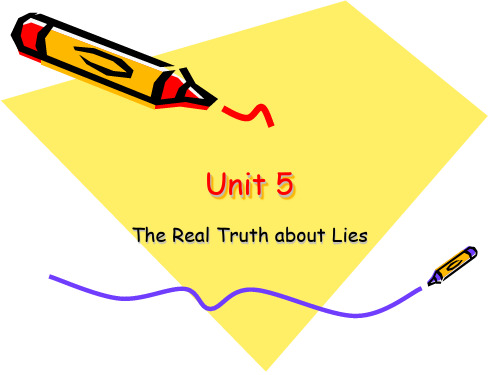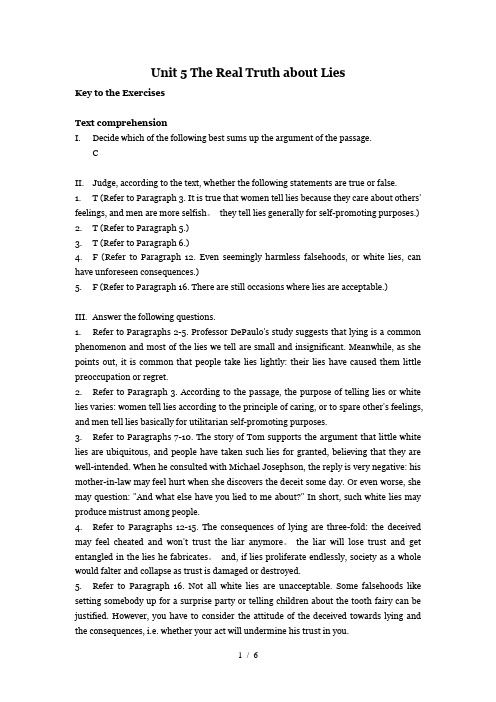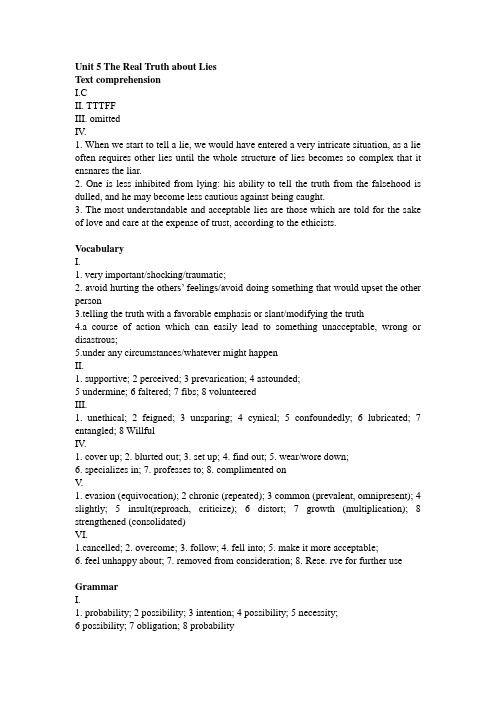课后练习答案Unit5 The real truth about lies
Unit 5 The Real Truth About Lies

About the author
• Randy Fitzgerald, a freelance writer, columnist and blogger. • “The Real Truth about Lies” is an article from Readers’ Digest published in November 1999.
Part I: Para. 1—6 Vocabulary and Grammar
• 1. (Para 1) volunteer : v. to give or offer willingly or without
being paid • n. a person who gives help willingly
English Debate
• positive side: White lies are welcomed in our society
• negative side: White lies are not welcomed in our society
Hale Waihona Puke Text 1 The Real Truth About Lies
Unit 5 Influence of lies in real life
A Survey
• Have you ever lied to someone?
• Write down one of your lies and the reason why you lied.
Different lies
an earth-shattering discovery
• eg: 震撼世界的重大事件。
an event of earth-shattering importance
Unit 5 The Real Truth about Lies解析

Part Two
ubiquitous: seeming to be everywhere似乎无所 不在的,十分普遍的, 相当于“common” e.g. :Smoking in public is a ubiquitous problem. 在公共场合吸烟是一个无处不在的问题。 ubiquitously (adv) 无处不在地 ubiquity (n). 普遍存在;到处存在 Invariably: constantly, always一贯地,始终如一地 e.g. :Invariably I get up at 6:00 in the morning. 我一贯早上六点钟起床。 blurt out:脱口而出 e.g.: He blurted out the secret before we could stop him. 在我们制止他之前,他已将秘密脱口而出。
② a distinguishing quality of being excellent or important 优秀;杰出;卓越:
eg:a singer of distinction 优秀歌唱家
• Coarsen
• To become or make sth. become thicker or rougher 变厚;变粗糙: • Eg: Her hands were coarsened by hard work. • 繁重的劳动使她的双手变得粗糙了。
prevarication:the state of avoiding giving a direct answer or making a frim decision. eg:His prevarication on this matter made us angry. be devoted to:致力于,专心于 characterize sb./sth.as:描述,刻画...的特 征
课后练习答案Unit5Therealtruthaboutlies

Unit 5 The real truth about l ies.V ocabu l ary.1. Explai n the underl inedpart in each senten ce in your own words.(1)very import ant/shocki ng/trauma ti c;(2) avoidhurtin g the others’feelin gs;(3)modify ing the truth;(4) a course of action whichcan easily lead to someth ing unacce ptabl e, wrongor disast rous;(5)underany circum stanc es/whatev er might h appen;2. Fill in the blankin each senten ce with a word takenfrom the box in the proper form.(1) suppor tive; (2) percei ved; (3) prevar i cati on; (4) astoun ded;(5)underm i ne; (6) falter ed; (7) fibs; (8) volunteered3. Fill in the blanks with the approp riate formsof the givenwords. (1) unethi cal; (2) feigne d; (3) unspar i ng; (4) cynical;(5) confou ndedl y; (6) lubric a ted; (7) entang l ed; (8) Willfu l4.Fill in the blankin each senten ce with an approp riate phrasa l verb or colloc ation takenfrom the text.(1) cover u p; (2) blurte d out; (3) set up; (4) find out;(5) wear down; (6) specia lizein; (7) profes ses to; (8) compli mente d, on;5. Give a synony m or an antony m of the word underl inedin each senten ce in the sense i t is used.(1) evasio n(equivo catio n); (2) chroni c (repeate d);(3) common ( preval ent, omnipr esent); (4) slightly;(5) insult (reproa ch, critic i ze); (6) distor t;(7) growth (multip l i cati on); (8) streng thene d (consoli date d)6. Explai n the underl inedphrasa l verbsin your own words.(1)cancel l ed; (2)overco me; (3)follow; (4)fell into;(5)make it more accept able; (6)feel unhapp y about;(7)remove d from consid e rati on; (8)reserv e for future use.Grammar.1. 1.probab ility2.possib i lity3.intent i on4.possib ility5.necess i ty6.possib ility7.obliga tion8.probab ility2. Comple te each senten ce with what you thinkthe most approp riate…1~5 CCBAD6~10 BBBAA3. rewrit e the senten ces belowu singthe words and phrase s from the box.(1) He can’t have told us everyt hing.(2) Someth ing must have gone wrong.(3) She can’t be only thirty years ol d.(4) They may not know yet.(5) The road could/may have been closed.(6) The police must know that.(7) Theremay/couldhave been a traffi c jam.(8) The letter could/may arrive today.(9) That will/must be my mother.(10) Thereshould be time to do some shopping.4.Rewrit e the follow ing senten ce, using verble ss clause s.1. When in doubt, tell the truth. It will confou nd your enemie s andastoun d your friends.2. When heated, metal e xpand s.3. If true, it will causeu s a lot of troubl e.4. Whenev er possib l e, they should be typed.5. When in Rome, do as the Romans do.6. Send the goods now, if ready.7. If necess ary, ring me at home.8. He glance d about a s if in search of someth ing.5. Comple t e the senten ces with the proper forms of the verbs given.1. discus sing, having reache d2. paying3.Lying, sittin g4. to pacify, to be pacifi ed, grumbl i ng5. repeat, to make, to do6. going, stay7. to see, to avoid, hittin g8. to arrive, rising9. doing10. to makeTransl ation.1. 1. 十分惊人的是,这些无数次说谎的人称,说谎并没有使他们十分纠结或后悔。
Unit 5 The real truth about lies练习答案综合教程三

Unit 5 The real truth about lies练习答案综合教程三Unit 5 The Real Truth About LiesIn today's society, lies are a common occurrence in both our personal and professional lives. We often find ourselves questioning the truthfulness of others and even lying ourselves. This unit will explore the different aspects of lies, including their impact on relationships, the psychology behind lying, and strategies for detecting deception.1. The Impact of Lies on RelationshipsLies can have a profound impact on relationships, be it friendships, romantic relationships, or professional partnerships. When trust is broken through deception, it can be challenging to rebuild. Lies can create distance, erode intimacy, and lead to a breakdown in communication.Furthermore, lies can cause emotional harm. Discovering that someone close to us has been dishonest can result in feelings of betrayal, anger, and disappointment. If lies persist, it can destroy the foundation of any relationship, making it difficult for both parties to move forward.2. The Psychology of LyingUnderstanding the psychology behind lying can shed light on why people choose to deceive others. Lying is often a deliberate act intended to manipulate the truth and gain some personal advantage. Psychologists have identified various reasons why individuals lie, which include:a) Self-interest: People may lie to protect themselves from negative consequences or to achieve personal gain.b) Fear: Fear of punishment or the desire to avoid conflict can lead individuals to tell lies.c) Desire for approval: Some people lie to gain acceptance or be seen in a more favorable light by others.d) Protection: Individuals may lie to protect themselves or someone they care about from harm or embarrassment.3. Strategies for Detecting DeceptionIt is not always easy to detect lies, as skilled liars can be convincing. However, there are strategies that can help increase our ability to detect deception:a) Nonverbal cues: Pay attention to a person's body language, facial expressions, and tone of voice. Inconsistent or overly animated gestures, avoidance of eye contact, or a shaky voice may indicate deception.b) Inconsistencies in storytelling: Liars may have difficulty maintaining a consistent narrative or may contradict themselves when questioned in detail.c) Microexpressions: These fleeting facial expressions can reveal true emotions that may conflict with the lie being told.d) Gut instincts: Trust your instincts and listen to any feelings of suspicion or discomfort you may have when someone is speaking.4. Honesty and Building TrustOpen and honest communication is essential for building and maintaining trust in relationships. To promote a culture of honesty, it is crucial to:a) Lead by example: Be truthful and transparent in your own words and actions.b) Encourage honesty: Create an environment where it is safe for others to be honest without fear of judgment or punishment.c) Build trust gradually: Trust takes time to develop, so be patient and consistent in your actions.d) Address past lies: When trust has been broken, have open and honest conversations about the impact of the deception and work together to rebuild trust.In conclusion, lies have the power to damage relationships, hinder communication, and erode trust. Understanding the impact of lies on relationships, the psychology behind lying, and strategies for detecting deception can help foster a culture of honesty and build stronger connections with others. It is imperative to remember that honesty and trust are essential in all aspects of our lives. Through open and transparent communication, we can navigate the complexities of lies and ultimately maintain healthier and more fulfilling relationships.。
Unit 5 The Real Truth about Lies

White lies
Suppose you are in trouble. When your parents call you and ask how you are, will you tell them a lie by saying that you are fine or tell them the truth? A white lie is one that lacks evil intent. It is harmless or trivial, and is frequently said in order to show the speaker's good intention and avoid hurting someone’s feelings.
2 One student and six Charlottesville residents
professed to have told no falsehoods. The other 140 participants told 1535.
questions: paras. 1-6
Part 1
Main idea
Theme: to prove the real truth about lies.
The tone: quite humorous as it resorts to daily life
and causes much resonance.
In this text, the author asserts the ubiquitous
Unit 5
LOGO
应用英语系 戚萍萍
Teaching objectives
I.
To talk about the topic of lying freely and understand the real truth of lies.
Unit-5-The-real-truth-about-lies练习标准答案综合教程三

Unit 5 The Real Truth about LiesKey to the ExercisesText comprehensionI. Decide which of the following best sums up the argument of the passage.CII. Judge, according to the text, whether the following statements are true or false.1. T (Refer to Paragraph 3. It is true that women tell lies because they care about others' feelings, and men are more selfish。
they tell lies generally for self-promoting purposes.)2. T (Refer to Paragraph 5.)3. T (Refer to Paragraph 6.)4. F (Refer to Paragraph 12. Even seemingly harmless falsehoods, or white lies, can have unforeseen consequences.)5. F (Refer to Paragraph 16. There are still occasions where lies are acceptable.)III. Answer the following questions.1. Refer to Paragraphs 2-5. Professor DePaulo's study suggests that lying is a common phenomenon and most of the lies we tell are small and insignificant. Meanwhile, as she points out, it is common that people take lies lightly: their lies have caused them little preoccupation or regret.2. Refer to Paragraph3. According to the passage, the purpose of telling lies or white lies varies: women tell lies according to the principle of caring, or to spare other's feelings, and men tell lies basically for utilitarian self-promoting purposes.3. Refer to Paragraphs 7-10. The story of Tom supports the argument that little white lies are ubiquitous, and people have taken such lies for granted, believing that they are well-intended. When he consulted with Michael Josephson, the reply is very negative: his mother-in-law may feel hurt when she discovers the deceit some day. Or even worse, she may question: "And what else have you lied to me about?" In short, such white lies may produce mistrust among people.4. Refer to Paragraphs 12-15. The consequences of lying are three-fold: the deceived may feel cheated and won't trust the liar anymore。
unit 5

Unit 5 The Real Truth about LiesI1 When we start to tell a lie, we have entered a very intricate situation, as a lie often requires other lies until the whole structure of lies becomes so complex that it ensnares the liar.2 One is less inhibited from lying; his ability to make moral right and wrong judgments is dulled, and he may become less cautious against being caught.3 The most understandable and acceptable lies are those which are told for the sake to love and care at the expense of trust, according to the ethicists.I1 very important/shocking/traumatic2 avoid hurting the other’s feelings/avoid doing something that would upset the other person3 telling the truth with a favorable emphasis or slant/modifying the truth4 a course of action which can easily lead to something unacceptable, wrong, or disastrous5 under any circumstances/whatever might happenII1 supportive2 perceived3 prevarication4 astounded5 undermine6 faltered7 fibs8 volunteeredIII1) ethic n.→ ethical a.→ unethical a.伦理学是哲学的分科。
综合英语三U5课后答案

Unit 5 The Real Truth about LiesText comprehensionI.CII. TTTFFIII. omittedIV.1. When we start to tell a lie, we would have entered a very intricate situation, as a lie often requires other lies until the whole structure of lies becomes so complex tha t it ensnares the liar.2. One is less inhibited from lying: his ability to tell the truth from the falsehood is dulled, and he may become less cautious against being caught.3. The most understandable and acceptable lies are those which are told for the sake of love and care at the expense of trust, according to the ethicists.VocabularyI.1. very important/shocking/traumatic;2. avoid hurting the others’ feelings/avoid doing something that would upset the other person3.telling the truth with a favorable emphasis or slant/modifying the truth4.a course of action which can easily lead to something unacceptable, wrong or disastrous;5.under any circumstances/whatever might happenII.1. supportive; 2 perceived; 3 prevarication; 4 astounded;5 undermine;6 faltered;7 fibs;8 volunteeredIII.1. unethical; 2 feigned; 3 unsparing; 4 cynical; 5 confoundedly; 6 lubricated; 7 entangled; 8 WillfulIV.1. cover up;2. blurted out;3. set up;4. find out;5. wear/wore down;6. specializes in;7. professes to;8. complimented onV.1. evasion (equivocation); 2 chronic (repeated); 3 common (prevalent, omnipresent); 4 slightly; 5 insult(reproach, criticize); 6 distort; 7 growth (multiplication); 8 strengthened (consolidated)VI.1.cancelled;2. overcome;3. follow;4. fell into;5. make it more acceptable;6. feel unhappy about;7. removed from consideration;8. Rese. rve for further use GrammarI.1. probability; 2 possibility; 3 intention; 4 possibility; 5 necessity;6 possibility;7 obligation;8 probabilityII.CCBAD BBBAAIII.1. He can’t have told us everything.2. Something must have gone wrong.3. She can’t be only thirty years old.4. They may not know yet.5. The road could/may have been closed.6. The police must know that.7. There may/could have been a traffic jam.8. The letter could/may arrive today.9. That will/must be my mother.10. There should be time to do some shopping.IV.1. When in doubt, tell the truth. It will confound your enemies and astound your friends.2. When heated, metal expands.3. If true, it will cause us a lot of trouble4. Whenever possible, they should be typed5. When in Rome, do as the Romans do6. Send the goods now, if ready7. If necessary, ring me at home.8. He glanced about as if in search of something.V.1.discussing, having reached2.paying3.Lying, sitting4.to pacify, to be pacified, grumbling5.repeat, to make, to do6.going, stay7.to see, to avoid, hitting8.to arrive, rising9.doing10.to make, to seeTranslationI. E-C1. Most strikingly, these tellers-of-a-thousand-lies reported that their deceptions caused them “littl e preoccupation or regret.”十分惊人的是,这些无数次说谎的人称,说谎并没有使他们十分纠结或后悔。
- 1、下载文档前请自行甄别文档内容的完整性,平台不提供额外的编辑、内容补充、找答案等附加服务。
- 2、"仅部分预览"的文档,不可在线预览部分如存在完整性等问题,可反馈申请退款(可完整预览的文档不适用该条件!)。
- 3、如文档侵犯您的权益,请联系客服反馈,我们会尽快为您处理(人工客服工作时间:9:00-18:30)。
Unit 5 The real truth about lies.Vocabulary.1. Explain the underlined part in each sentence in your own words.(1)very important/shocking/traumatic;(2) avoid hurting the others’ feelings;(3)modifying the truth;(4) a course of action which can easily lead to something unacceptable, wrong or disastrous;(5)under any circumstances/whatever might happen;2. Fill in the blank in each sentence with a word taken from the box in the proper form.(1) supportive; (2) perceived; (3) prevarication; (4) astounded;(5)undermine; (6) faltered; (7) fibs; (8) volunteered3. Fill in the blanks with the appropriate forms of the given words. (1) unethical; (2) feigned; (3) unsparing; (4) cynical;(5) confoundedly; (6) lubricated; (7) entangled; (8) Willful4.Fill in the blank in each sentence with an appropriate phrasal verb or collocation taken from the text.(1) cover up; (2) blurted out; (3) set up; (4) find out;(5) wear down; (6) specialize in; (7) professes to; (8) complimented, on;5. Give a synonym or an antonym of the word underlined in each sentence in the sense it is used.(1) evasion(equivocation); (2) chronic (repeated);(3) common ( prevalent, omnipresent); (4) slightly;(5) insult (reproach, criticize); (6) distort;(7) growth (multiplication); (8) strengthened (consolidated)6. Explain the underlined phrasal verbs in your own words.(1)cancelled; (2)overcome; (3)follow; (4)fell into;(5)make it more acceptable; (6)feel unhappy about;(7)removed from consideration; (8)reserve for future use.Grammar.1. 1.probability2.possibility3.intention4.possibility5.necessity6.possibility7.obligation8.probability2. Complete each sentence with what you think the most appropriate…1~5 CCBAD 6~10 BBBAA3. rewrite the sentences below using the words and phrases from the box.(1) He can’t have told us everything.(2) Something must have gone wrong.(3) She can’t be only thirty years old.(4) They may not know yet.(5) The road could/may have been closed.(6) The police must know that.(7) There may/could have been a traffic jam.(8) The letter could/may arrive today.(9) That will/must be my mother.(10) There should be time to do some shopping.4.Rewrite the following sentence, using verbless clauses.1. When in doubt, tell the truth. It will confound your enemies andastound your friends.2. When heated, metal expands.3. If true, it will cause us a lot of trouble.4. Whenever possible, they should be typed.5. When in Rome, do as the Romans do.6. Send the goods now, if ready.7. If necessary, ring me at home.8. He glanced about as if in search of something.5. Complete the sentences with the proper forms of the verbs given.1. discussing, having reached2. paying3.Lying, sitting4. to pacify, to be pacified, grumbling5. repeat, to make, to do6. going, stay7. to see, to avoid, hitting8. to arrive, rising9. doing10. to makeTranslation.1. 1. 十分惊人的是,这些无数次说谎的人称,说谎并没有使他们十分纠结或后悔。
2. 尽管承认说谎,91%的反馈者称“对自己的道德和性格还是感到满意”。
3. 毫无疑问,这些“好心的谎话”是无害的、善意的,也是一种社交必需的润滑剂。
4. 如果你没有把握,马克·吐温给了我们一条经验法则:“拿不准的时候,就说实话,实话会迷惑敌人,震惊朋友。
”2.1. Hamlet feigned madness when he was hesitating what to do.2. Prevarication is one of the techniques this businessman likes to employ.3. Sometimes the light of the truth is just too dazzling, so white lies are ubiquitous.4. Many women in America profess that they are unhappy with their status of second-class citizens.5. On the impulse of the moment, he blurted out the secret.6. You should get rid of any prejudice, resist temptations and let nothing warp your judgment.7. Being over-sensitive and imaginative, he often weaves a tangled web in mind.8. He is very popular among his peers as he always tries to spare others any trouble.3. 美国有调查表明,大多数人出于不同的原因,在不同程度上说谎。
有时,他们说谎是为了让别人高兴。
比如:装出积极的态度来肯定朋友或配偶,实际上他/她内心却没有如此认可。
有时,他们说谎时为了提升自己。
这种情况现在越来越普遍了。
有时,是为了避免伤害别人,当未加粉饰的实情难以接受的时候更是如此。
有人则把说谎看作一种必要的社交润滑剂。
不管怎么说,说谎都是为了掩饰实情。
关于说谎,不同的人有不同的观点。
有些人认为,假话,即便是看上去无害的假话,也可能带来预料不到的后果。
一个人说了第一个谎话之后,他就需要说更多的谎话来掩饰最初的谎话,最后会变成沉重的精神负担。
一位哲学家警告说,如果一个人说谎,他就等于把自己置于一个溜滑的斜坡上,因为他的心里障碍减轻了。
但是,另外一些人则认为,我们不必不惜一切代价去避免所有善意的谎言,因为一个善意的谎言可能仅仅是牺牲信任而去换取关心和爱护而已。
对此,你持什么观点呢?Exercises for integrated skills.2. Fill in each blank in the passage below with ONE word you think appropriate.(1) service (2)rather (3)off (4)are(5)advantage (6)much (7)relations (8)if (9)as (10)moral (11)either (12)truth。
